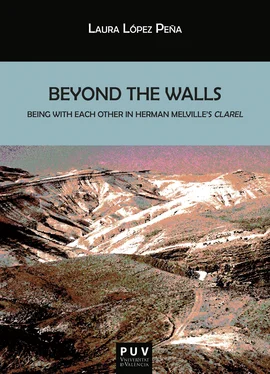Laura López Peña - Beyond the Walls.
Здесь есть возможность читать онлайн «Laura López Peña - Beyond the Walls.» — ознакомительный отрывок электронной книги совершенно бесплатно, а после прочтения отрывка купить полную версию. В некоторых случаях можно слушать аудио, скачать через торрент в формате fb2 и присутствует краткое содержание. Жанр: unrecognised, на английском языке. Описание произведения, (предисловие) а так же отзывы посетителей доступны на портале библиотеки ЛибКат.
- Название:Beyond the Walls.
- Автор:
- Жанр:
- Год:неизвестен
- ISBN:нет данных
- Рейтинг книги:3 / 5. Голосов: 1
-
Избранное:Добавить в избранное
- Отзывы:
-
Ваша оценка:
- 60
- 1
- 2
- 3
- 4
- 5
Beyond the Walls.: краткое содержание, описание и аннотация
Предлагаем к чтению аннотацию, описание, краткое содержание или предисловие (зависит от того, что написал сам автор книги «Beyond the Walls.»). Если вы не нашли необходимую информацию о книге — напишите в комментариях, мы постараемся отыскать её.
Beyond the Walls. — читать онлайн ознакомительный отрывок
Ниже представлен текст книги, разбитый по страницам. Система сохранения места последней прочитанной страницы, позволяет с удобством читать онлайн бесплатно книгу «Beyond the Walls.», без необходимости каждый раз заново искать на чём Вы остановились. Поставьте закладку, и сможете в любой момент перейти на страницу, на которой закончили чтение.
Интервал:
Закладка:
On a more specific level, Clarel provides mechanisms to discharge universalism from its traditionally negative association with homogenization and colonialism, in order to reevaluate its validity, and urgency, in a world of deep inter-human divisions. The first condition for this dissociation is the need to rethink universalism so as to make it expressive of the plurality by which it is constituted, since, as Hannah Arendt noted in 1958, “[p]lurality is the condition of human actions because we are the same, that is, human, in such a way that nobody is ever the same as anyone else who ever lived, lives or will live” (8). Since its emergence in the 1960s, poststructuralist theory has developed into a determining turning point for the rethinking of subjectivity, community, and human relationships, which became particularly relevant after the proliferation of identity politics movements in that decade. Radically questioning the very notion of identity, and stressing what it criticized as both the homogenizing and the constraining essentialism of identity-based groups and communitarian formations, poststructuralism has introduced ways to think subjectivity beyond identity and other historical grands récits . In the twenty-first century, poststructuralism has pervaded the fields of social sciences, cultural studies, postcolonial studies, sociology, anthropology, and, of course, literature, opening up theoretical possibilities and new conceptual spaces which situate difference, plurality, and hybridity at the core of contemporary debates on politics, subjectivity, and human relationships. Owing to this fact, political activism has been freed from rigid conceptions of (inter)subjectivity and communitarianism, thus encouraging fluid standpoints from which to imagine more plural and decentralized—and, therefore, less hierarchical and oppressive—interpersonal ways of relating. Nonetheless, even if the deconstructionist importance of poststructuralism to problematize monolithic Meanings and essentialist conceptions of Truth has been deeply influential and widely acknowledged, some theorists have also critized the celebrative attitude of poststructuralism in front of such deconstructionism. These thinkers have pointed out as well the political paralysis at the heart of poststructuralism in its failure to construct a political project from its theoretical premises that is based on plurality and social justice. Such are the objections of Linda M. G. Zerilli and Ernesto Laclau:
Now that “we” all know and agree that poststructuralism is critically valuable but politically bankrupt; now that we all know and agree that the “old universal” was indeed a “pseudo-universal”, so the homecoming narrative goes; we can get on with the project of constructing a “new universal”. (Zerilli 3-4)
The correct question, therefore, is not so much which is the politics of poststructuralism, but rather what are the possibilities a poststructuralist theoretical perspective opens for the deepening of those political practices that go in the direction of a “radical democracy”. (Laclau New Reflections 191)
Deeply influenced by poststructuralism, yet facing what they consider its political failure, both Zerilli and Laclau do acknowledge the rich theoretical possibilities poststructuralism provides for political thinking. Actually, although the two thinkers turn to universalism as a political project that may be validly democratic, they carry out a rethinking of universalism out of its negative neutralizing reputation that is enabled by the theoretical tools of poststructuralism. Indeed, poststructuralism constitutes one crucial perspective to rethink universalism since, as Étienne Balibar has noted, “no discussion about universality […] can usefully proceed with a ‘univocal’ concept of ‘the Universal’” (48).
While the theoretical possibilities offered by poststructuralism illuminate Melville’s literary critique of communitarianisms and of monolithic conceptions of identity and Meaning, the author in no case provides a celebrative portrayal of the end of grand narratives of the kind poststructuralism vindicates. On the contrary. At the same time that he emphasized the destructive dangers of clinging to one-sided views of the world and monologic Truths, Melville set off to record the suffering, anxiety, alienation, and even destructive and self-annihilating tendencies caused by the sense of emptiness and uncertainty after realizing the lack of certainties. Restlessly oscillating between nihilism and the daring necessity to live searchingly (“ He can neither believe, nor be comfortable in his unbelief; and he is too honest and courageous not to try to do one or the other ”, commented Nathaniel Hawthorne of his friend as Melville was on his way to Palestine [qtd. in Bezanson “Historical” 511]), the author analyzed the, both positive and harmful, potentiality of intersubjectivity upon human relationships, beyond the divides that segregate human beings within separate identity-based groups. The present book interprets this necessity to live seachingly as an existential need to explore the potentiality of intersubjectivity to develop dialogic thinking and knock down inter-personal walls. Moving away from homogenizing conceptions of the “Universal”, Melville persisted in analyzing the sociopolitical and ethical implications of a plural universalism grounded on intersubjectivity. This intersubjective universalism—as the present volume names it—can be best articulated, from a theoretical perspective, through the arguments on subjectivity, interpersonal relationships, human vulnerability, unchosen vicinities, and global ethics posed by contemporary thinkers Hannah Arendt, Martin Buber, Judith Butler, Zygmunt Bauman, Jacques Derrida, Emmanuel Levinas, and Jean-Luc Nancy, among others. The following sections make use of these theorizations, not only from the perspective of poststructuralist theory but also from the perspectives of sociology, philosophy, ethics, and political science, in order to theoretically articulate the political and ethical possibilities of Melville’s literary project.
THE INTERPERSONAL IS POLITICAL
The claim that the interpersonal is political may look like an obvious one, especially after decades of identity politics movements stressing the politics of the personal. Nonetheless, in the present-day society of individualisms and well-interiorized inter-human divisions, both psychological and physical, it is important to lay emphasis on the potentiality of intersubjectivity for the development of relationships and thinking beyond such separation. This volume conceives intersubjectivity as a space of “shared understanding” ( SAGE 468 and Encyclopedia 402) between individuals, in their difference, which enables the circulation of “meaning[s] between subjects” ( Blackwell 161) as these subjects engage in collaborative negotiation and co-creation of signification by means of their interactions. In other words, intersubjectivity is the process created by and between individuals—necessarily and inevitably different—when they set on a dialogue of reciprocal recognition of one another’s difference and yet common human condition. Herman Melville best portrays intersubjectivity when he narrates the development of Ishmael and Queequeg’s feelings of togetherness in the first chapters of Moby-Dick , from Ishmael’s first fearful encounter of the unknown “Other” in Queequeg (a pagan Polynesian cannibal with yellowish skin and huge tattoos over his body) to the American’s realization not only of Queequeg’s noble nature but also of the redeeming power his friendship with Queequeg has upon himself:
I began to be sensible of strange feelings. I felt a melting in me. No more my splintered heart and maddened hand were turned against the wolfish world. This soothing savage had redeemed it. There he sat, his very indifference speaking a nature in which there lurked no civilized hypocrisies and bland deceits. Wild he was; a very sight of sights to see; yet I began to feel myself mysteriously drawn towards him. And those same things that would have repelled most others, they were the very magnets that thus drew me. (62)
Читать дальшеИнтервал:
Закладка:
Похожие книги на «Beyond the Walls.»
Представляем Вашему вниманию похожие книги на «Beyond the Walls.» списком для выбора. Мы отобрали схожую по названию и смыслу литературу в надежде предоставить читателям больше вариантов отыскать новые, интересные, ещё непрочитанные произведения.
Обсуждение, отзывы о книге «Beyond the Walls.» и просто собственные мнения читателей. Оставьте ваши комментарии, напишите, что Вы думаете о произведении, его смысле или главных героях. Укажите что конкретно понравилось, а что нет, и почему Вы так считаете.










